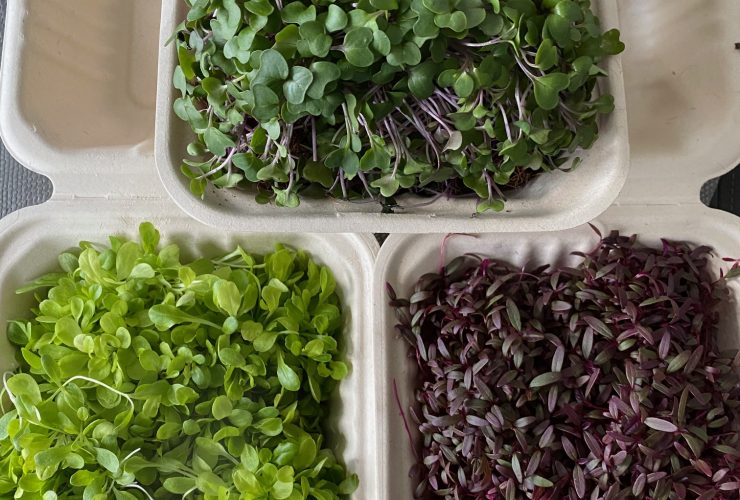The Smart Life Soup Cleanse this month includes an option to add home grown organic microgreens. My friend grows them locally and they are an amazing way to increase nutrients and help with the detox of the soup cleanse.
Microgreens are also available to buy in the Shop, so give these little nutrient-dense vegetables a try.
What are Microgreens?
Microgreens are essentially baby plants. After a seed is first planted, the seed germinates in the soil. This tiny shoot is the first stage of growth. The second stage of growth is known as the microgreen stage. As soon as the first leaves, or cotyledons, start to unfurl, these fragile shoots and first leaves are known as microgreens. Rather than grow them further, we harvest them at this time and we refer to them as microgreens.
Why Microgreens?
Because the microgreens are harvested in the early stages of growth, they contain all of the nutritional framework of their full-grown counterparts, but in a tiny little package. This means you can eat fewer microgreens than the fully grown vegetable form, but you still get all of the nutritional benefits. It is often difficult to eat the amount of broccoli or kale, for example, that you would need from the full-grown plants in order to gain all the nutritional benefits. But in the microgreen form, the intensity of the nutrients allows you to eat a smaller portion and gain the same benefit.
Microgreens are also packed full of flavor! The flavor of each plant is intensified in its microgreen form.
What are the nutritional benefits of Microgreens?
Phytochemicals in Microgreens
It’s reported that microgreens are up to 40 times more laden with phytochemicals than their full-grown counterparts. Phytochemicals help humans to protect against physical problems such as eye issues, bad LDL cholesterol, heart disease and Alzheimer’s disease. They are also powerful in inhibiting cancer, impeding the growth of cancer cells.
Cancer-Fighting Cruciferous Microgreens
The Brassica family of vegetables make wonderful microgreens. Broccoli, cabbage, arugula, and other cruciferous vegetables, have long been famous for their ability to fight cancer and they offer a huge variety of positive health attributes.
Vitamins and Minerals
We all know that vitamins and minerals are essential for our health. The vitamin and mineral profile of each microgreen varies, depending on the type of microgreen, but a few examples include:
Potassium
Potassium is an electrolyte that helps to regulate systems in your body. It is important to keep your heart beating regularly, and it helps your nervous system function properly and your muscles contract. Sunflower microgreens, as well as basil and kale, all have large amounts of potassium.
Zinc
Zinc helps the body produce proteins and DNA, and is especially important in pregnancy and in growing fetuses. Zinc also helps your body ward off foreign bacteria and viruses. Wheatgrass is a good source of zinc.
Magnesium
Magnesium keeps your systems functioning, and has a hand in so many systems of the body, including nerves, bones, immunity, and the creation of red blood cells. Clover microgreens are a good source of magnesium.
Vitamin A
Vitamin A helps your organs work well and is important for vision, immunity, and reproduction. Vitamin A is found prolifically in beta-carotene. Many microgreens contain Vitamin A, like carrots, kale, and spinach.
Vitamin C
Vitamin C, also known as ascorbic acid, maintains the body’s body tissues. Vitamin C is essential for wound healing, strengthening cartilage, teeth and bones, and immunity. Pea shoots and cabbage microgreens are great sources of Vitamin C.
Vitamin K
Vitamin K aids the body in blood clotting and is helpful in bone metabolism. The microgreen garnet amaranth is a good source of Vitamin K, and although you may never have heard of amaranth, it is one of the most nutritionally-rich microgreens of all.
Vitamin E
Because it is so prolific, Vitamin E is a vitamin you don’t want to skimp on. Vitamin E increases the health of blood, brain, and skin. It has been known to slow down the effects of Alzheimer’s disease and is also important for vision, liver function, and prostate health. Daikon radish microgreens are a great source of Vitamin E.
Vitamin B
Vitamin B affects the way your brain works, the energy levels you possess, and how your cells metabolize. It also can prevent infection and promote cell health. Radishes and sunflowers are both great sources of Vitamin B.
Microgreens are available to buy in the Shop, so give these little nutrient-dense vegetables a try.






Leave a Reply